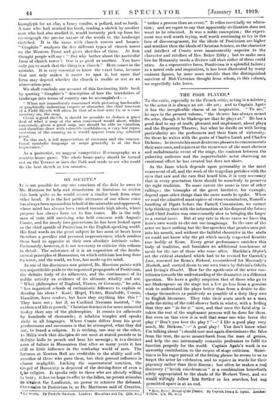THE POOR PLAYER.* To the critic, especially to the French
critic, acting is a science; to the actor it is always an art—the art ; 11.11d to Captain Agate it has the inexplicable charm of an inspiration. "To me," he says in the present volume, the theatre has always meant The actor, though it be Shakespeare that he plays at." He has a good deal to say of truth, pleasant and unpleasant, about playa and the Repertory Theatre; but what he dwells on with loving particularity are the performers and their feats of virtuosity. On these he writes with the gusto of ('harks Lamb and Chadea Dickens; he invents his most dexterous phrases to commemorate their successes, and rejoices at the recurrence of the most obviorre and melodramatic event of the stage, the contrast between the pulsating audience and the imperturbablc. actor observing an emotional effect he has created but does not share.
As the fame which depends upon personality is the most evanescent of all, and the work of the tragedian perishes with tha eyes that saw and the ears that heard him, it is very necessary that in every generation there should be somebody to preserve the right tradition. To some extent the same is true of other callings; the triumphs of the great barrister, for example, depend upon other things than the mere words he spoke. When we read the admitted masterpiece of cross-examination, Russell's handling of Pigott before the Parnell Commission, we cannot help thinking that with the information at his disposal the future Lord Chief Justice was unnecessarily slow ia bringing the forgee to a crucial issue. But at any rate in these cases we have the, hero's own words to eke out our imaginiugs. In the ease of tha actor we have nothing but the fine speeches that greater men put into his mouth, and without the faithful chronicler in the stalls we could not know why the pit which merely respected Kernble rose bodily at Kean. Every great performance enriches this body of tradition, and furnishes an additional touchstone of merit for the use of those who come after. Macklin's Shylotl set tho critical standard which had to be revised for Ganiek'a Lear, renewed for Mean's Richard, reconsidered for Macrcady's Macbeth, and carried down to our own times by Salvini's Othello and Irving's Hamlet. How far the apotheosis of the actor con- tributes towards tho understanding of the dramatist is a different question. We have a guilty suspicion that of those who go to see Shakespeare on the stage not a few go less from a genuine wish to understand the plays better than from a desire to dis. charge themselves es painlessly as possible of a duty they owe to English literature. They take their seats much as a man pulls the string of the cold-shower bath in winter, with a feeling that they are in for it" stow, and that once tire fatal stop is taken the rest of the unpleasant process will be done for them. But even on this view it is well that some one who loves the play ("Don't you love the play "—"I like a good play very much, Mr. Dickene."—" A good play ! You don't know what I'm talking about ") should now and again discriminate the false from the true, the mere mountebank from the man of genius, and help the one intrinsically romantic profession to fulfil its function properly for the world. Captain Agate's work is no unworthy contribution to the corpse of stage criticism. Some. times in his eager pursuit of the fitting phrase he seems to us to forget the actor he celebrates, and to rejoice in words for their piquancy rather than their fitness ; but often he makes a real discovery ("lavish voicelessness" is a combbaatioa henceforth solely appropriated to the shade of Sir Herbert Tree), and wa would willingly follow him further in his searches, but our permitted space is at an end.
• Mar, Rim Emig of Ms Thee.% By Captain Isnot X, Atat,0, Louisa; (ems.. Us. ed, ccl.1


































 Previous page
Previous page